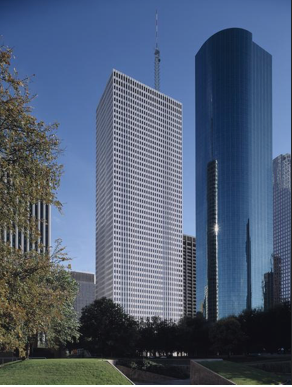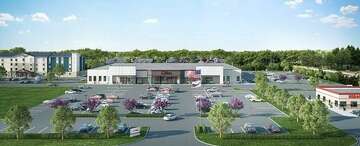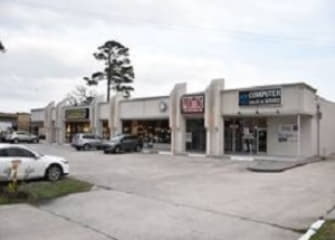The par 3, like the rest of the course, also is deep inside the 100-year floodplain. Cypress Creek, which forms the club’s southern and western boundaries, jumped its banks and flooded the course in the Memorial Day and Tax Day storms. Four feet of water filled the clubhouse during Hurricane Harvey; it did not fully recede from the course for two weeks.
The club’s frustrated owner last week sold the 27-acre site containing the clubhouse, tennis courts and swimming pool for $11.5 million to the Harris County Flood Control District, which plans to raze the buildings. The county plans eventually to acquire the remaining 206 acres of the club and course and use the site for massive detention basins.
The initial transaction is emblematic of the county’s all-of-the-above approach to flood control. As engineers search for places to store stormwater, especially in heavily developed areas, the flood control district increasingly is turning to golf courses.
“Well over 600 homes experienced flooding in the general vicinity of Raveneaux Country Club in our recent flood events, from 2015 to 2019,” said Matt Zeve, the flood control district’s deputy director. “There’s a large need for stormwater detention volume in the Cypress Creek watershed.”
With an influx of capital from the $2.5 billion bond voters approved in 2018, the flood control district has more cash for a land acquisition than at any point in its history and golf courses often are ideal sites for detention projects, Zeve said. They frequently are located next to bayous, abut neighborhoods in need of protection and already are cleared of trees. They also have a single owner, allowing for a quicker acquisition than the county’s typical piecemeal approach to purchasing flood-prone properties.
A Chronicle analysis of the county’s interactive floodplain map found more than 30 Harris County courses at least partly inside the 100-year floodplain, from municipal links to the private Golf Club of Houston, which hosts an annual PGA Tour event.
Harris County’s push for better flood protection, made more urgent after Harvey flooded more than 200,000 homes in 2017, comes at a time when Americans are playing fewer rounds of golf. About 10 percent of courses in the United States closed between 2006 and 2018, according to the National Golf Foundation, a research firm for the industry.
A glut of course building in the 1980s and ‘90s and a 30 percent decline in golfers since 2000 have been major causes of club closures. Houston’s climate is a blessing and a curse for course owners; tee times are available year-round, though several clubs have been subjected to repeated flooding.
Harris County decided against rebuilding the Bear Creek Golf World course after it was swamped by Harvey. The storm also inundated Kingwood Cove Golf Club for the third time in two years, convincing the owners to sell the parcel on the San Jacinto River to developers. The City of Houston closed the money-losing Brock Park course after it flooded in 2016.
Voluntary buyouts
Zeve said several courses have approached the county about selling out. Ongoing negotiations are secret until a deal is reached, he said, though he encouraged interested owners to call the flood control district. The county is open to deals where courses can remain open while helping reduce flooding, he said.
“If a golf club wants to re-do their course … so that during a storm event, that course can temporarily store some stormwater, and maybe provide some flood damage reduction benefit, we’re happy to partner,” Zeve said.
Sometimes, flooding experts and residents in vulnerable neighborhoods try to move the process along. Phil Bedient, a professor at Rice University’s severe storm think tank, said much of Meyerland would be protected if Westwood Golf Club and Braeburn Country Club on Brays Bayou were used to store floodwater. He proposed partnerships in which clubs agree to host detention projects and the county commits to repairing courses after storms. He said the county should seize needed property, if necessary.
“It’s better to clean up a golf course than thousands of homes,” Bedient said.
The general manager at Braeburn declined to comment; his counterpart at Westwood did not respond to requests for comment.
Zeve said he sometimes gets frantic calls from course owners who suspect the county is trying to force them to sell. He assures them all course buyouts are voluntary.
Former golf courses also are attractive acquisitions for developers, as they often are the only open parcels in densely populated neighborhoods. Commercial real estate developer MetroNational bought the former Pine Crest Country Club in Spring Branch and in 2017 flipped the property to a homebuilder.
Houston City Council unanimously approved permitting 900 homes on the site, which sits almost entirely inside the 100-year floodplain. Several civic groups opposed the project and questioned city leaders’ commitment to flood protection. Just weeks earlier, council members enacted stricter floodplain building standards.
Zeve said the flood control district would have liked an opportunity to purchase the Pine Crest plot for a flood mitigation project. Ed Browne, founder of advocacy group Residents Against Flooding, said Pine Crest was a missed opportunity. He said the group “wholeheartedly supports conversion of golf course lands to regional detention basins.”
The county jumped at the chance to dig detention ponds on the former Inwood Forest Country Club on White Oak Bayou. The City of Houston purchased the 227-acre site in 2011 to build two basins; the county joined the project three years ago to construct an additional 10. The volume of water that can be stored there exceeds that of the Astrodome. In southeast Houston, the Clear Lake City Water Authority partnered with a nonprofit to convert a former golf course into a 200-acre detention pond.
Final round
The county’s deal with Raveneaux allows the club a year to wind down operations and sell equipment.
A foursome of retirees, all longtime members, said during a recent weekday round they doubted a detention basin would provide many benefits.
“They’re going to buy these big, expensive buildings, tear them down, and put a hole in the ground,” said Ben Mason on the 14th fairway. “It won’t hold much water.”
Bernie Hollenshead said the flood control district instead should build a long-debated third reservoir in northwest Harris County, to complement the existing Addicks and Barker dams. The quartet conceded, however, they are biased in favor of keeping their tee times.
The shame in the Raveneaux sale, club Vice President Lou Mills said, is the course never has been in better shape. Greens and sand traps are in pristine condition, and the course looked verdant on a recent soggy morning.
He conceded Cypress Creek poses a constant threat, however. Walking along the second hole, he pointed to a section of the waterway that swelled during a recent three-quarter-inch downpour. He said residents of the Champions Forest neighborhood north of the club, where tony homes top $1.3 million, are wary when the forecast includes rain.
“Every time there’s a rain event here, they’re all freaking out,” Mills said. “The minute you get rainfall, this becomes a raging river.”
Harris County Commissioner Jack Cagle, whose Precinct 4 includes Raveneaux, said he has sympathy for residents who bemoan the community’s loss when the club closes. The stately clubhouse, modeled after a French chateau, has held weddings, retirement parties, and other events since the late 1970s.
The prospect of providing badly needed flood protection on the site, however, is too golden an opportunity to pass up as neighborhoods along Cypress Creek continue to fare poorly in storms, he said. Cagle’s own home, three miles downstream from Raveneaux, flooded during Harvey.











